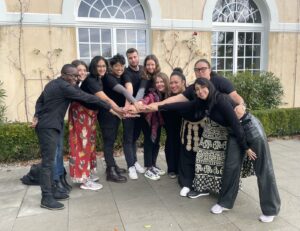What Is Gender-Based Online Disinformation – And What Can We Do About It?
Originally published by Lucina Di Meco for World Council of Churches
Di Meco began by explaining what gendered disinformation is, and why we should be concerned about it.
The most immediate motive behind this kind of disinformation—which occurs across the globe—is to alter public understanding of female politicians’ track records and to discourage women running for office. At a deeper level, however, gendered disinformation undermines women’s rights, human rights, and weakens democratic institutions.
“We have a majority of women who report either witnessing online violence against other women—or being targets of violence themselves,” said Di Meco. “One of the most common forms of harm that women experience online has to do with misinformation.”
We draw a line between gendered disinformation and other types of online harms encompassed under the broad definition of tech-facilitated gender-based violence.
“Gender disinformation is a specific type of harm, intentionally weaponizing misogyny to undermine women political leaders who are at the forefront of important democratic and human rights battles,” she said.
She offered examples of disinformation campaigns against female politicians in Tunisia, India, Brazil, Italy, Hungary, Germany, Canada, Australia, and Peru.
“This field isn’t necessarily super old but has a lot of evidence,” she explained.
The case studies she spoke of largely were cases analyzed in the “Monetizing Misogyny research series,” which refer proclivity toward profit-making, including by incentivizing and rewarding the most outrageous and harmful content.
What happens when a disinformation campaign targets a woman?
In the face of targeted disinformation, “women often self-censor or limit their online presence, even when this might reduce their opportunities for visibility and for having their voices heard,” said Di Meco. “We see a violation of women’s freedom of expression right there.”
In the case of women in politics, this might reduce their effectiveness. “When you are being asked about the latest fake story about you, it’s very hard to be successful and push the agenda you stand for,” she said.
Often times, online disinformation expands offline—through the media, or through posters visible in public places, posing a threat to women’s reputations and even safety.
“Something very important to point out is that not all women leaders are attacked in the same way,” she said. “Through our research, we found that disinformation also often surrounds women who stand up for immigrant rights and minority rights,” she added.
The responsibility of platforms
Di Meco explained how social media platforms play into the monetization of misogyny.
“Social media platforms are curators of content,” she said—and their digital platform algorithms reward and amplify hate for profit.
Currently social media platforms are not having to comply with many standards when it comes to their users. “They say they do certain things like eliminating hate speech, that they are against dis-informative and harmful content—but it keeps coming up,” said Di Meco.
She underscored the need for a global framework to regulate social media platforms and prevent disinformation—a framework that holds social media platforms accountable for the harms that their products cause to their own customers. “They are private companies that have consumers, but who is protecting their consumers from the negative effects of what they experience online, and its impacts on democracy and social cohesion?” she asked.
Part of the problem is how social media platforms are designed. “They are, in large part, to blame for what we see online—and that has repercussions for what we see offline,” she said.
The responsibility of civic and religious groups
Di Meco believes that calling out the misogyny in these attacks is vitally important. “We believe absolutely women in politics as well as men in politics should be held accountable for what they say and do as policymakers. Yet, there is a substantial difference between a criticism that happens in the context of a civil debate, and the type of sexist attacks that women are targeted with, which often include rape and death threats, as well as false and defamatory claims, doctored photos, and fake obscene videos,” she said.
